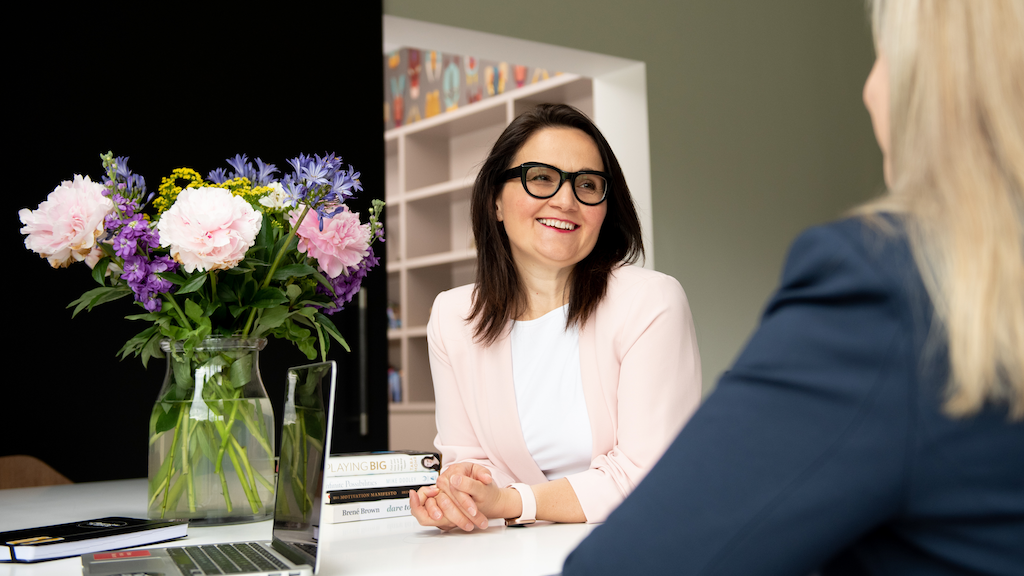Many people ask me what is the difference between counselling and coaching and I get it. When you’re feeling stuck in life or you’re at an impasse with your career, it can feel confusing to know who best to approach for support to move forward – a counsellor or a coach? As both a coach and a counsellor, I want to explore the different approaches, and hopefully give you some direction on what might be most helpful in your situation if you’re thinking about talking to a professional about problems in your life like anxiety or a feeling of being stuck.

When should you see a counsellor?
Counselling – or psychotherapy, as it’s often called – involves a series of sessions with a trained counsellor who will help you look at how you feel, why you feel that way, and how those feelings are impacting your life. Usually, you will work one-to-one with your counsellor (or with another member of your family if you are seeking couples or family therapy) on a regular basis over a number of weeks or months, to look at how you feel and what you’d like to be different – about your emotional health and your life circumstances – in the future.
Common reasons to see a counsellor
Many people first think about seeing a counsellor when they realise that they feel unhappy in their life. One of the most common reasons to see a counsellor is anxiety or depression. You might notice that you have less motivation than usual for the things you used to like doing, or you may be struggling to sleep, or be aware of the stomach-churning sensation that often accompanies worry and anxiety.
Other people first decide to seek counselling to help them process a trauma like violent crime, or a road traffic accident. Often it’s a bereavement or a difficult medical diagnosis that leads people into counselling. People come to counselling for help with addiction, relationships, issues of gender and sexuality, social anxiety and self-esteem, eating disorders, anger, neurodiversity, and many other life issues that can cause difficult feelings. Whatever’s happening for you, if you know you don’t feel like you want to, a counsellor is a good place to start.
What happens in a counselling session?
Depending on the type of therapy, your counsellor will usually give you space to talk about what’s happening, and invite you to explore how you feel about your situation, and what you’d like to be different. Don’t worry if you find it difficult to put your feelings into words – that’s your therapist’s job. They will gently help you to identify what you’re feeling, your automatic thinking, and how you can develop resilience so that these emotions don’t feel so uncomfortable for you moving forward.
How many counselling sessions will you need?
It’s impossible to know how long counselling will take, but the principle of weekly therapy is important to gain momentum and support the client at the beginning of what can feel like a challenging journey.
If you seek therapy on the NHS, you will usually be offered between 6-12 sessions and in some cases, that may be enough to help you feel better. If the trauma is significant, or if your emotions relate to repeating patterns that have developed over a long period of your life, or in childhood, you may want to spend longer in therapy to really change unhelpful coping mechanisms and turn things around. Many people spend a year or more in therapy, and some decide they will benefit from seeing a therapist indefinitely as they meet the challenges that happen to all of us throughout a lifetime.
How can coaching help me?
On the other hand, coaching is a form of personal development based on the belief that the individual has all the answers to their own life issues within them. It can relate to any aspect of your life, but is often undertaken by individuals who need clarity and focus in specific areas of their personal lives, their career, or their business.

Anna Wilk, a transition coach for women based in St Albans, Hertfordshire says:
“I help women through life and career transitions and hold space for my clients so they can connect with their own wisdom. Unlike counselling, which often looks at past events in a client’s life, coaching focuses more on the future goals a client might have, whether personal or professional. It’s less focused on processing and resolving emotional distress, and more on developing practical skills to take the actions needed to remove blocks to a client’s future goals.
What happens in a coaching session?
Anna says that in the first session, she helps the client explore their current situation, their feelings around it, and what they’d like to achieve by the end of their coaching journey. She supports clients to reflect and bring awareness to how they feel as they discuss their challenges, and uses tools and techniques to facilitate a deeper connection with themselves. She says “As we go through the session, we set up actionable steps towards a client’s goals, practical things they can do in between sessions to move closer to where they want to be.”
What can coaching help with?
Coaching might be useful if you’re experiencing a block of any kind. Anna says she sees clients who need help moving forward in their careers or who are returning to work after a break, are struggling with self-worth or imposter syndrome, or who might be experiencing a problem with a particular colleague in the workplace and want to find better communication strategies.
Coaching can also help you figure out what your strengths are so you can play to them instead of trying to focus on areas where you may not have as much power. Once you know how to leverage your own particular skillset and personality traits, you will be able to find strategies that get you to where you want to go much more quickly. It can also help you notice more opportunities when they present themselves, and give you the confidence to go for them.
How much coaching will I need?
Coaching can be done in short, sharp bursts when you have a hurdle you want to get past, or in longer stints if you’re struggling with something that’s more deep-rooted. A single session is often enough, or you can do blocks of 6-10 sessions before taking a break to focus on moving forward. Some people dip in and out of coaching whenever they notice that something is holding them back, to problem-solve and decide what they want to do next.
Whatever you need help with, the first step is to make contact. Whether you’re drawn to counselling or coaching, that initial conversation will help you establish a direction. A good coach or counsellor will spend time getting to know you and will advise you if they think you need counselling first, or if you might be better served by creating a goal-focused plan to change something tangible in your life. Get in touch with Anna or myself via our websites if you’d like to ask more questions:
